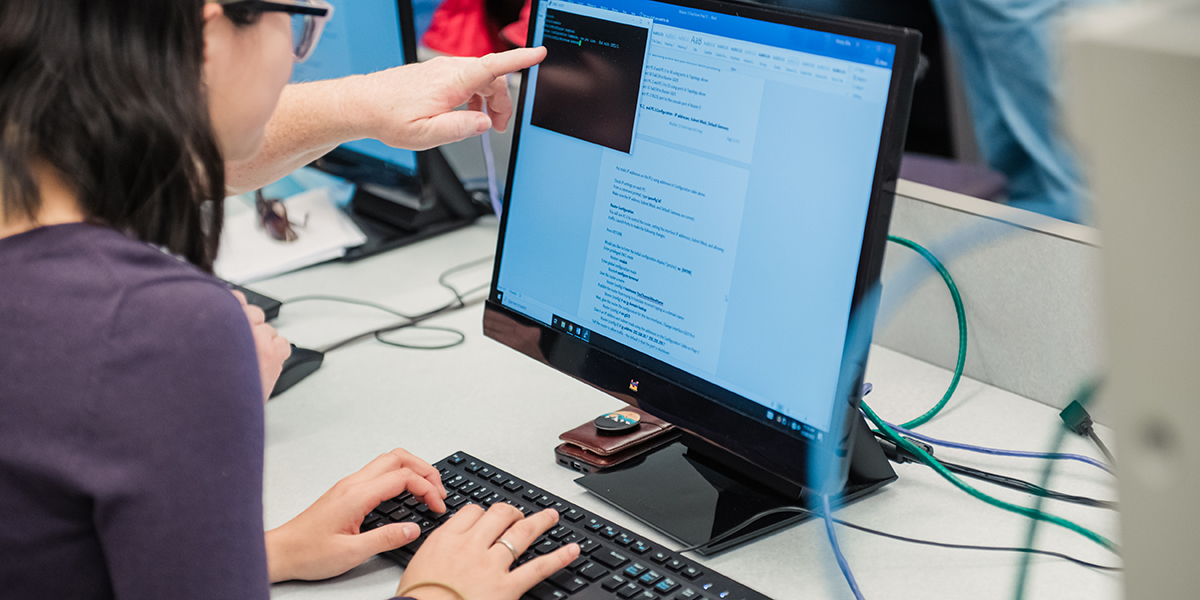
Wingspan, Fall 2024
Whether you're ready to embrace a career working with new technology or want a secure job that needs more of a human touch, AACC can help. Here are four examples of fast-growing professions that can help you succeed in a changing world: cybersecurity, plumbing, nursing and visual arts.
No matter what the future workplace holds, it is almost guaranteed to have an element of technology. AACC makes sure all students leave ready to use technology successfully, whether by earning a degree in a field like cybersecurity or mechatronics or simply by improving each student’s technological literacy.
Lily Davis didn’t even know if she wanted to go to college, but after being chosen for the President’s Opportunity Scholarship, she enrolled at AACC. She explored a few different career paths, but ultimately chose cybersecurity and networking. She wanted to set herself up for a stable job with a good paycheck.
“This new world of computers has been so much more intriguing than I ever thought it would.”
The Bureau of Labor Statistics predicts demands for information security analysts will grow by 32% over the next 10 years, much faster than average. The 2023 median pay was $120,000 per year. “I am really looking forward to seeing where this career is going to take me long-term ... because this is a whole new world of a totally different type of literacy.”
AACC’S TECHNOLOGY PROGRAM ACCOLADES:
One thing the world will always need is plumbers, but the United States is facing a potential shortage. In the next few years, seasoned plumbers will retire at a faster rate than new ones enter the workforce. Bloomberg reported that by 2027, the U.S. will be short 550,000 plumbers.
AACC plumbing student Jean Bosco Nshimiyimana told Bloomberg he was drawn to the field because it seemed more resistant to automation than some other lines of work.
“I didn’t see any plumbing being done by robots, so I said, ‘OK, let’s do this one.’”
Interest in skilled trades jobs such as plumber, electrician and HVAC technician is growing among young people. They are drawn to the job security these fields provide. These services are always in demand and require a skillset that may be less likely to be replaced by AI technology than those in some white-collar jobs. Shortages in skilled trades workers have also helped drive up salaries. And, since skilled trades training costs less and takes less time than a four-year education, students can begin their career faster at a lower cost.
AACC offers several short-term job training programs that can be completed in a few weeks to a few months. Students receive hands-on training from industry-experienced instructors in our state-of-the-art Clauson Center for Innovation and Skilled Trades. Some students even complete their training for free through scholarships.
Health care is a constantly evolving field. New research and new technology can create demands for new training or career pathways. Looking to the future, there’s another demand to consider: the aging American population. As the number of older Americans increases, there’s an increased need for health care workers to take care of them. The Department of Labor estimates that employment in health care is expected to grow much faster than average over the next decade, with about 1.8 million job openings each year. Many of these jobs pay higher than the average annual wage.
Nurses are expected to be in especially high demand, and AACC is stepping up to fill the gap. AACC’s Nursing program is consistently rated as one of the best in the state and is one of the college’s most popular programs. To meet the community’s need for nurses, the college has set the goal of doubling the enrollment of the Registered Nursing program. The AACC Foundation is raising money for private scholarships that will provide resources to cover up to 50% of the cost of the Registered Nursing program for eligible students.
It doesn’t stop at nursing. AACC’s School of Health Sciences offers more than a dozen other health-related degrees and certificates. Students receive hands-on instruction in classrooms designed to resemble hospital rooms and medical exam rooms in our three-story, state-of-the-art Health and Life Sciences Building, which opened in 2021.
Have you ever wondered if Shakespeare would’ve used AI? In an era defined by new technology, the liberal arts education is evolving to embrace new skills. At AACC, faculty teach that working in the arts isn't just about mastering traditional techniques, it's about embracing new tools and ideas to create innovative and meaningful work.
The Visual Arts department is preparing students for tomorrow's artistic landscape by combining creativity and technology. Media production students are using AI to create special effects while studio art students integrate AI into digital designs. Sculpture students are using digital software and 3D resin printers to create 3D prototypes. There are students blending the strokes of their paintbrushes with the pixels of new technologies. A student can sketch an image outside and scan the image with their iPad to see what it would look like in a different medium.
“Our job is to make sure that all the tools that are at these students’ disposal, that they can be proficient in those tools,” said Laura Pasquini, program navigator.
Despite fears around new technology eliminating liberal arts careers, Pasquini shared a key human component that AI lacks, empathy. "It shows you can manage well and anticipate the needs of others. These are crucial in a world increasingly integrating AI. If you want to be a conductor of AI, you have to understand how other people think and feel,” she said.
AACC’s liberal arts programs spark lively discussions and foster critical thinking, exploring the ethical boundaries of integrating technology into creative expressions. Students graduate not just as skilled artists, but as thoughtful creators prepared to leave their mark and navigate a complex and ever-evolving world.